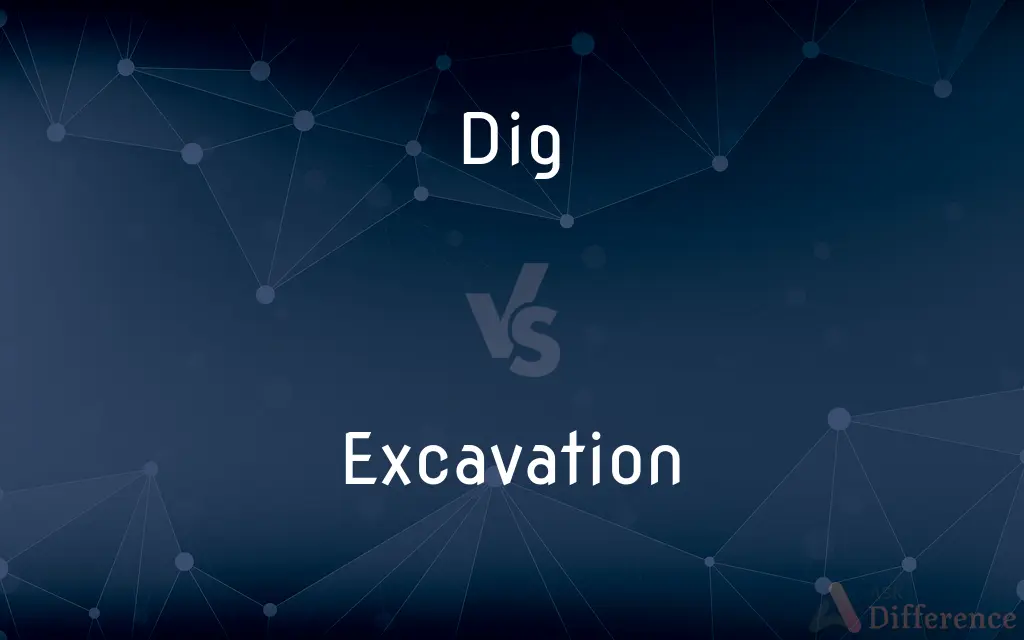Dig vs. Excavation — What's the Difference?
By Urooj Arif & Fiza Rafique — Updated on April 15, 2024
Dig refers to the act of removing soil or other material, often with tools like a shovel; excavation involves the systematic process of uncovering archaeological sites or other significant buried features.

Difference Between Dig and Excavation
Table of Contents
ADVERTISEMENT
Key Differences
Dig primarily denotes the simple action of creating a hole or trench in the ground using tools such as shovels or spades, which is a basic manual activity. On the other hand, excavation is a more structured activity that involves not only the removal of soil but also the careful processing and recording of findings for scientific or construction purposes.
While digging is often a smaller-scale task performed in everyday activities such as gardening or minor construction work, excavation is typically associated with larger-scale projects like archaeology, mining, or major construction, requiring specialized tools and techniques.
Digs can be impromptu or lack a predefined plan, focusing on reaching a certain depth or removing a certain amount of material. Conversely, excavations are usually well-planned and methodically carried out to preserve the integrity of the site and its artifacts.
In terms of tools, digging often requires basic implements like shovels, hoes, and picks. Whereas, excavation might use these tools along with more sophisticated equipment like excavators, trowels, brushes, and even technological aids like ground-penetrating radar.
The skill set for digging can be relatively basic, accessible to anyone who can operate a shovel. In contrast, excavation often requires skilled professionals who understand the nuances of soil types, stratigraphy, and artifact handling to ensure that significant findings are well-preserved and documented.
ADVERTISEMENT
Comparison Chart
Definition
The act of removing material from the ground
A planned, careful process to uncover sites
Scale
Typically small-scale
Often large-scale
Tools Used
Shovels, hoes
Shovels, excavators, trowels, radar
Purpose
General, such as gardening
Specific, such as archaeology or construction
Skill Required
Basic manual skills
Advanced skills in specific fields
Compare with Definitions
Dig
Remove soil from the ground using a tool or machinery.
He began to dig a hole for the new tree.
Excavation
The process of digging out something from the ground, especially an archaeological site.
The excavation of the ancient ruins took months.
Dig
To search for something by moving things around.
She dug through her purse to find her keys.
Excavation
The action of hollowing or removing earth.
Excavation for the new subway line begins next week.
Dig
To investigate, uncover, or explore.
The journalist decided to dig deeper into the scandal.
Excavation
The careful investigation of a site, typically historical, to find artifacts.
Each layer of soil at the excavation provided valuable historical insights.
Dig
To thrust or poke forcefully or quickly.
He dug his elbow into my side to get my attention.
Excavation
The site where digging takes place, often in an archaeological context.
The excavation revealed numerous artifacts.
Dig
An informal term for understanding or liking something.
I really dig this new jazz album.
Excavation
A cavity or hole made by excavating.
An excavation was made to lay the foundation of the house.
Dig
To break up, turn over, or remove (earth or sand, for example), as with a shovel, spade, or snout, or with claws, paws or hands.
Excavation
The act or process of excavating.
Dig
To make or form by removing earth or other material
Dig a trench.
Dug my way out of the snow.
Excavation
A hole formed by excavating.
Dig
To prepare (soil) by loosening or cultivating.
Excavation
(uncountable) The act of excavating, or of making hollow, by cutting, scooping, or digging out a part of a solid mass.
Dig
To obtain or unearth by digging
Dig coal out of a seam.
Dug potatoes from a field.
Excavation
(countable) A cavity formed by cutting, digging, or scooping.
Dig
To obtain or find by an action similar to digging
Dug a dollar out of his pocket.
Dug the puck out of the corner.
Excavation
(countable) An uncovered cutting in the earth, in distinction from a covered cutting or tunnel.
Dig
To learn or discover by careful research or investigation
Dug up the evidence.
Dug out the real facts.
Excavation
(countable) The material dug out in making a channel or cavity.
Dig
To force down and into something; thrust
Dug his foot in the ground.
Excavation
(uncountable) Archaeological research that unearths buildings, tombs and objects of historical value.
Dig
To poke or prod
Dug me in the ribs.
Excavation
(countable) A site where an archaeological exploration is being carried out.
Dig
(Sports) To strike or redirect (a ball) just before it hits the ground, keeping it in play, as in tennis or volleyball.
Excavation
(countable) Something uncovered by archaeological excavation.
Dig
To understand fully
Do you dig what I mean?.
Excavation
The act of excavating, or of making hollow, by cutting, scooping, or digging out a part of a solid mass.
Dig
To like, enjoy, or appreciate
"They really dig our music and, daddy, I dig swinging for them" (Louis Armstrong).
Excavation
A cavity formed by cutting, digging, or scooping.
Dig
To take notice of
Dig that wild outfit.
Excavation
An uncovered cutting in the earth, in distinction from a covered cutting or tunnel.
The delivery of the excavations at a distance of 250 feet.
Dig
To loosen, turn over, or remove earth or other material.
Excavation
The act of digging;
There's an interesting excavation going on near Princeton
Dig
To make one's way by or as if by pushing aside or removing material
Dug through the files.
Excavation
The site of an archeological exploration;
They set up camp next to the dig
Dig
(Slang) To have understanding
Do you dig?.
Excavation
A hole in the ground made by excavating
Dig
A poke or thrust
A sharp dig in the ribs.
Excavation
The act of extracting ores or coal etc from the earth
Dig
A sarcastic, taunting remark; a gibe.
Dig
An archaeological excavation.
Dig
(Sports) An act or an instance of digging a ball.
Dig
Digs Lodgings.
Dig
To move hard-packed earth out of the way, especially downward to make a hole with a shovel. Or to drill, or the like, through rocks, roads, or the like. More generally, to make any similar hole by moving material out of the way.should this be split into senses?
They dug an eight-foot ditch along the side of the road.
In the wintertime, heavy truck tires dig into the road, forming potholes.
If the plane can't pull out of the dive it is in, it'll dig a hole in the ground.
My seven-year-old son always digs a hole in the middle of his mashed potatoes and fills it with gravy before he starts to eat them.
Dig
(transitive) To get by digging; to take from the ground; often with up.
To dig potatoes
To dig up gold
Dig
(mining) To take ore from its bed, in distinction from making excavations in search of ore.
Dig
To work like a digger; to study ploddingly and laboriously.
Dig
(figurative) To investigate, to research, often followed by out or up.
To dig up evidence
To dig out the facts
Dig
To understand, to like.
Dig
To thrust; to poke.
He dug an elbow into my ribs and guffawed at his own joke.
Dig
(volleyball) To defend against an attack hit by the opposing team by successfully passing the ball
Dig
To understand.
You dig?
Dig
To appreciate, or like.
Baby, I dig you.
Dig
An archeological or paleontological investigation, or the site where such an investigation is taking place.
Dig
A thrust; a poke.
He guffawed and gave me a dig in the ribs after telling his latest joke.
Dig
(volleyball) A defensive pass of the ball that has been attacked by the opposing team.
Dig
(cricket) An innings.
Dig
A cutting, sarcastic remark.
Dig
The occupation of digging for gold.
Dig
A plodding and laborious student.
Dig
A tool for digging.
Dig
A rare or interesting vinyl record bought second-hand.
A £1 charity shop dig
Dig
Digoxin.
Dig toxicity
Dig
To turn up, or delve in, (earth) with a spade or a hoe; to open, loosen, or break up (the soil) with a spade, or other sharp instrument; to pierce, open, or loosen, as if with a spade.
Be first to dig the ground.
Dig
To get by digging; as, to dig potatoes, or gold.
Dig
To hollow out, as a well; to form, as a ditch, by removing earth; to excavate; as, to dig a ditch or a well.
Dig
To thrust; to poke.
You should have seen children . . . dig and push their mothers under the sides, saying thus to them: Look, mother, how great a lubber doth yet wear pearls.
Dig
To like; enjoy; admire.
Dig
To work with a spade or other like implement; to do servile work; to delve.
Dig for it more than for hid treasures.
I can not dig; to beg I am ashamed.
Dig
To take ore from its bed, in distinction from making excavations in search of ore.
Dig
To work hard or drudge;
Peter dug at his books all the harder.
Dig
Of a tool: To cut deeply into the work because ill set, held at a wrong angle, or the like, as when a lathe tool is set too low and so sprung into the work.
Dig
To understand; as, do you dig me?.
Dig
To notice; to look at; as, dig that crazy hat!.
Dig
To appreciate and enjoy; as, he digs classical music as well as rock.
Dig
A plodding and laborious student.
Dig
A tool for digging.
Dig
An act of digging.
Dig
An amount to be dug.
Dig
Same as Gouge.
Dig
A critical and sometimes sarcastic or insulting remark, but often good-humored; as, celebrities at a roast must suffer through countless digs.
Dig
An archeological excavation site.
Dig
The site of an archeological exploration;
They set up camp next to the dig
Dig
An aggressive remark directed at a person like a missile and intended to have a telling effect;
His parting shot was `drop dead'
She threw shafts of sarcasm
She takes a dig at me every chance she gets
Dig
A small gouge (as in the cover of a book);
The book was in good condition except for a dig in the back cover
Dig
The act of digging;
There's an interesting excavation going on near Princeton
Dig
The act of touching someone suddenly with your finger or elbow;
She gave me a sharp dig in the ribs
Dig
Turn up, loosen, or remove earth;
Dig we must
Turn over the soil for aeration
Dig
Create by digging;
Dig a hole
Dig out a channel
Dig
Work hard;
She was digging away at her math homework
Lexicographers drudge all day long
Dig
Remove the inner part or the core of;
The mining company wants to excavate the hillsite
Dig
Poke or thrust abruptly;
He jabbed his finger into her ribs
Dig
Get the meaning of something;
Do you comprehend the meaning of this letter?
Common Curiosities
How do professionals ensure the safety of an excavation site?
Safety is ensured through careful planning, the use of appropriate tools, and adherence to legal and scientific standards.
What is the main difference between a dig and an excavation?
A dig is a basic act of removing soil, whereas an excavation is a more detailed and planned operation, often for archaeological or construction purposes.
Can digging be part of an excavation?
Yes, digging is a component of excavation but involves additional processes and care, particularly in archaeological contexts.
What tools are unique to excavation?
Excavation uses specific tools like trowels, brushes, and ground-penetrating radar, in addition to common digging tools.
Why is excavation important?
Excavation is crucial for uncovering past civilizations, understanding historical contexts, and assisting in construction planning.
How do archaeologists differentiate between a dig and an excavation?
Archaeologists refer to a dig as the physical act of removing soil, whereas an excavation is a more encompassing term that includes not only the dig but also the detailed recording and analysis of the site and its findings.
Are there any legal considerations for excavation projects?
Yes, excavation often requires permits and must comply with local, regional, and sometimes national regulations, especially when it involves archaeological sites or large construction projects.
How can one learn the skills necessary for professional excavation?
Professional skills in excavation can be acquired through formal education in fields like archaeology, geology, or civil engineering, supplemented by on-the-job training and specialized courses in excavation techniques and site management.
What types of projects typically require excavation rather than just digging?
Excavation is required for projects that need precise and careful removal of earth, such as archaeological digs, construction of building foundations, and large-scale landscaping projects.
What are the environmental impacts of excavation?
Excavation can significantly impact the environment by disrupting habitats, altering landscapes, and potentially leading to erosion or contamination if not managed properly.
Share Your Discovery

Previous Comparison
Mood vs. Mod
Next Comparison
Storage vs. StoreAuthor Spotlight
Written by
Urooj ArifUrooj is a skilled content writer at Ask Difference, known for her exceptional ability to simplify complex topics into engaging and informative content. With a passion for research and a flair for clear, concise writing, she consistently delivers articles that resonate with our diverse audience.
Co-written by
Fiza RafiqueFiza Rafique is a skilled content writer at AskDifference.com, where she meticulously refines and enhances written pieces. Drawing from her vast editorial expertise, Fiza ensures clarity, accuracy, and precision in every article. Passionate about language, she continually seeks to elevate the quality of content for readers worldwide.














































